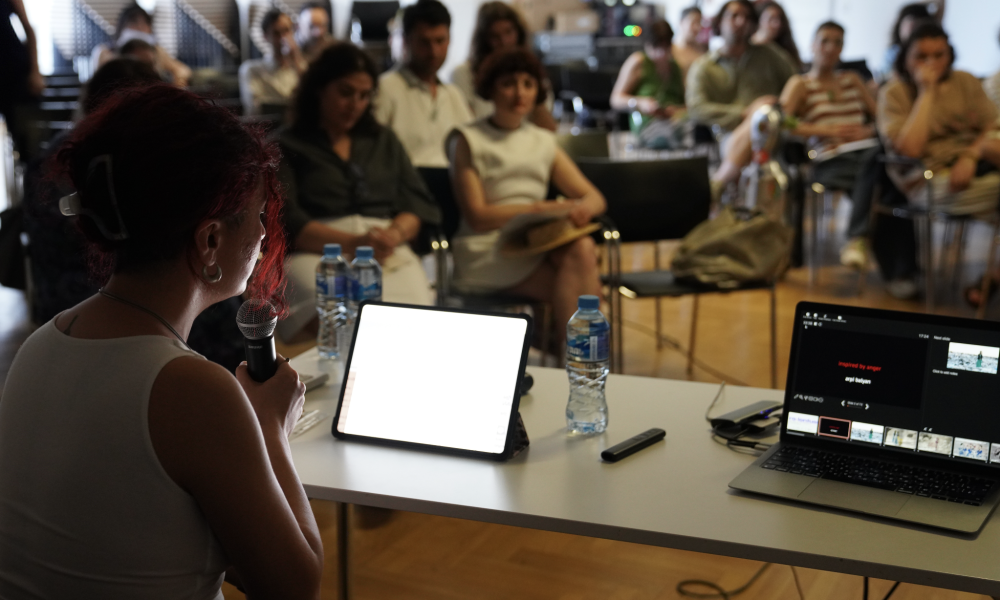The annual Re-Lentus cultural dialogue program, within the framework of this year’s Georgian edition in Tbilisi, addressed the theme of “Art and Resistance.” In this context, an opportunity was created to engage with three artists who challenge contemporary social and cultural inequalities and resist them through the language of creativity.
Implemented through the collaboration of Armenia’s CSN Lab and Georgia’s CuMa Lab, one of the core aims of the Re-Lentus program is to promote women cultural practitioners and to make their experiences more widely visible, while also fostering cultural exchange between the two neighboring countries.
As part of the program, at the Goethe-Institut Tbilisi, artists Arpi Balyan, Siranush Aghajanyan, and Hasmik Tangyan shared their professional experiences and journeys with the Georgian audience composed of curators, as well as figures from the arts and culture sector, while also presenting the challenges faced by contemporary Armenian artists.
Working across different media and formats, these artists are deeply engaged with the intersections of art, space, and resistance. Through performance, street art, graffiti, mosaic, and multimedia works, they question the harsh, often alienating surfaces of urban environments, exploring how we interact with those spaces and how bodies, especially women’s bodies, exist and are perceived in public. In doing so, they transform the city and its space into a creative medium.
Opening the event, artist and FemLibrary co-founder Arpi Balyan presented their work, which takes a sharp and unflinching look at militarisation, gender inequality, and the commodification of women’s bodies. Balyan’s graffiti acts as a bold visual statement within the urban landscape - shifting perspectives and introducing alternative narratives about identity, autonomy, and the right to choose. Balyan also shared their multimedia projects, which explore the presence (or absence) of women in public spaces, highlighting the deep-rooted questions of representation and presence.
Next, visual artist Siranush Aghajanyan spoke about her engagement with urban space, drawing from her mosaic interventions across various Armenian cities. She traced her artistic path from public space installations to founding the painter’s house studio “Firdus 48” in one of Yerevan’s targeted vernacular neighbourhoods. Aghajanyan also discussed Firdus's urban activist movement, emphasising the vital role art can play in resisting the destruction and privatisation of public space.
Reflecting on the interrelationship of space and body, performance artist Hasmik Tangyan presented how she deconstructs social and cultural norms tied to the body. She focused in particular on the public performance “Huzank u Zang”, which wove together early 20th-century Armenian futurist poetry, experimental music and movement to explore the roles imposed on women’s bodies, voices, and gestures. Tangyan spoke openly about the performance itself, the public backlash that followed, the pressures exerted by state institutions, and the legal proceedings still underway. Her story offered a powerful window into the forms of censorship and repression that contemporary art often faces in Armenia and the personal toll it takes on the artist.
The three public talks concluded with a discussion moderated by curator Irena Popiashvili, who facilitated an open dialogue between the artists and audience. The conversation touched on creative methods, artistic resistance, and the persistent challenges posed by traditional gender roles in both the Armenian and broader regional context.
Beyond the public event in Tbilisi, Re-Lentus also included visits and meetings with Georgian artists and cultural initiatives, aimed at sparking new connections and future collaborations. The artists visited the Women’s Initiatives Support Group (WISG), the Movement Theatre, the “Group Bouillon” art collective, Centre for Contemporary Art Tbilisi, and other organisations – all contributing to a meaningful exchange of perspectives and practices.
This year marks the fourth edition of the Relentus program, encompassing its Yerevan and Tbilisi chapters. In addition to reaffirming the project’s sustainability and relevance, it is also expanding its regional scope. Later this year, new voices of Belarussian female cultural practitioners and artists, who were forced to leave the country due to political reasons, will join the program – continuing the series of cultural dialogues that we began years ago.
The Re-Lentus project is implemented with the support of the Danish Cultural Institute (DCI) within the New Democracy Fund (NDF) programme.
photos: Anka Gujabidze

